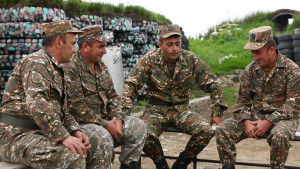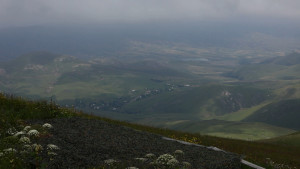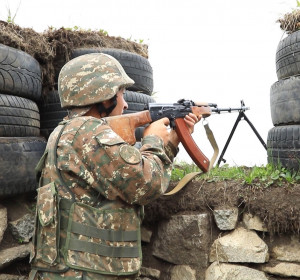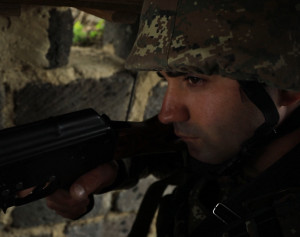“I BELONG HERE, IN THE TRANCHE, MY SON BELONGS HERE, ON THE BORDER OF THE MOTHERLAND …”
 The self-defense battles in Artsvashen started in 1989 and lasted for 3 years. Artsvashen, located in the eastern part of Gegharkunik region, was an enclave in the Getabek region of Azerbaijan, the last Armenian piece of land.
The self-defense battles in Artsvashen started in 1989 and lasted for 3 years. Artsvashen, located in the eastern part of Gegharkunik region, was an enclave in the Getabek region of Azerbaijan, the last Armenian piece of land.
For 3 days, starting August 4, 1990, the soldiers of the Vanadzor Motorized Rifle Regiment selflessly ensured the evacuation of the civilian population from the intensifying and gradually narrowing fire ring. On August 7, the regiment remained under siege of the enemy.
On August 8, 1992 Artsvashen was finally emptied of Armenians.
Davit, Ashot, Novlem and Ohan can only see their birthplace from the trenches, the hope in their hearts that one day they will definitely return.
Some 719 families were displaced from the once large and well-built Artsvashen, most of whom settled in the settlements of Gegharkunik region. All that is left of Artsvashen today are the keys to the doors that have never been closed, as a sacred relic, as a guarantee of return, as a memory passed down from generation to generation, a promise never to make a mistake, a determination never to give up.
“I was 12 years old when we were forced to leave Artsvashen. We came and lived in Chambarak. The bitter loss of Artsvashen in our hearts we are still strong and firm on our land. If they leave us today, we will free our birthplace from captivity with the guys from Artsvashen,” says contract serviceman, Sen Serg Davit Ghazaryan.
 Ashot Chilingaryan, who is the oldest of his fellow friends, recalls: “That day, our car coming out of Artsvashen was passing through the highway connecting the village to Chambarak for the last time. We took what we could, what we were able to take. We left the rest, the rest and … Artsvashen,” he recalls.
Ashot Chilingaryan, who is the oldest of his fellow friends, recalls: “That day, our car coming out of Artsvashen was passing through the highway connecting the village to Chambarak for the last time. We took what we could, what we were able to take. We left the rest, the rest and … Artsvashen,” he recalls.
“I belong here, in the trench, my son belongs here, on the border of the Homeland. And we will stay in the trench for a long time, because somewhere, something went wrong, and that mistake must be corrected,” says Ashot with the confidence and determination typical of Artsvashen.
“In 1992, I was 22 years old. The enemy was firing from all sides, it was pressing, and we had to leave, we could not keep our village. If they let us to do so, we will take Artsvashen right now,” Ashot Chilingaryan confirms his friend’s words.
Novlem spent a lifetime in the trenches. Here, in the north-east of the Homeland, he is standing on the border, his son is in another part of the front line.
“In this war, our sons also have their share of the fight. I raised my son this way and I’m sure my son will win,” says Novlem.
Today, on the way to Artsvashen, there is the dust of memory that is thickening year by year, the traces of the past, which, curling up on the big and small hills, now become only empty unknowns. In the once prosperous Artsvashen, not even a stone is left unturned today. It is a familiar handwriting, trying to erase our traces from those areas.
“They can destroy a building and a structure, but our spirit is unshakable,” says Ohan Ohanyan, “As our minister mentioned, if there is a new war, then we’ll take new territories.”
♦♦♦
 “Two years is enough to understand that we have no alternative. By taking turns, we must protect the state border of our country, until the day when, in the eyes of the civilized world, Armenians no longer have to reassert their right to live in peace in their country with weapons,” says Mamikon Nikoghosyan, who serves with his brother on the front lines. “I finished my term service in 2014 and after some time I decided to return to the service. My term service has also been on the front lines. I still want to make a modest contribution to the defense of my homeland,” Mamikon said.
“Two years is enough to understand that we have no alternative. By taking turns, we must protect the state border of our country, until the day when, in the eyes of the civilized world, Armenians no longer have to reassert their right to live in peace in their country with weapons,” says Mamikon Nikoghosyan, who serves with his brother on the front lines. “I finished my term service in 2014 and after some time I decided to return to the service. My term service has also been on the front lines. I still want to make a modest contribution to the defense of my homeland,” Mamikon said.
The July battles on the front line could not but have an adequate response in this part of the border as well. The boys assure that they know what to do, լավ their entrusted combat position on the state border is in strong hands.
“The enemy tried several times to fire from different caliber weapons in the direction of our positions, but after reporting to the superior and receiving the relevant order, we gave an adequate response. At the moment, the situation in the border area entrusted to us is not tense,” the battalion commander Hovsep Minasyan joins the conversation.
 … The curves of the road gradually take us away from the front line. The trenches remain at the top. After talking to the boys, we are once again convinced. There, on the front lines, the weight and capacity of devotion and compassion cannot be described by any unit of measurement. Probably the enemy also understood that Artsvashen was not forgotten here.
… The curves of the road gradually take us away from the front line. The trenches remain at the top. After talking to the boys, we are once again convinced. There, on the front lines, the weight and capacity of devotion and compassion cannot be described by any unit of measurement. Probably the enemy also understood that Artsvashen was not forgotten here.
By NAIRA HAMBARDZUMYAN
Photos by ARSHAK KHACHATRYAN
Category: #36 (1356) 9.09.2020 - 15.09.2020, National army, Spotlight










